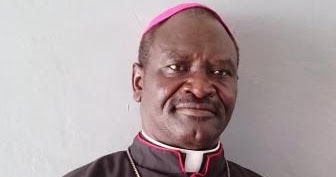SUDAN, SOUTH SUDAN: “Kneel Down to Pray, Hear the Voice of People Crying for Peace,” Catholic Bishop to Sudan Leaders

Bishop Tombe Trille Yunan
Ginaba Lino
The Sudanese Catholic Bishop of El-Obeid Diocese has on 28 May, urged the two conflicting parties in Khartoum to kneel down to pray, and hear the voice of the people, the children, and the women that cry for peace.
The long ongoing clashes which erupted in April 15, 2023 between the Sudanese Armed Forces (SAF) and the paramilitary Rapid Support Forces (RSF) in Sudan, resulting in the displacement of more than 8.6 million people, including internally displaced people (IDPs), asylum seekers and refugees remains unsolved.
“I call on the leaders to kneel down to pray, and hear the voice of God and the voice of the people, the children, the women that cry for peace, and also the blood that cries on the ground of very innocent people who died because of crossfire.”
Bishop Tombe Trille Yunan stressed that there is no clue to light of peace dialogue that can bring hope for Sudanese.
“I personally believe that our leaders are not yet for dialogue, the fighting and the conflict have upper hand in using the guns as we hear their languages “unless we defeat the other group who won’t put down weapons,” Bishop Tombe says in the interview dated May 28.
He stated that there’s always a ward about dialogue, but two leaders don’t come together because of some conditions they give to each other which does not make them to settle, adding that the time will come for the to think of the people and Nation.
The Local Ordinary of Sudan’s Catholic Diocese of El-Obeid highlights on humanitarian condition of the few that remain in the city, saying they are living very hard live due to “food shortage and health wise,” adding that if the situation continue, people of Sudan will be more divided on “ethnic line or region line,” which says it will be unhealthy.
Emphasizes that he is afraid that the more fighting, the more people get scatter, and the more hatreds is grown within the heart of different ethnic groups in Sudan.
Bishop Tombe goes on to ask the two Sudanese leaders to go back to dialogue as Children of one mother and one father because the Sudan is enough to carry them.
He added that, the war affected all the activities in Sudan including pastoral and social activities carried by the Church, Schools are suspended since the 15 of April 2023 until today, saying priests that are in different parishes remain within the parish and they can’t go anywhere.
Bishop Trille explained how live is for Sudanese as the conflict continues, describing it as first century live.
“It’s not easy, a lot of suffering, my coming out of El-Obeid is through dazed road. We have gone back to the first century of our creation, and our good roads are left we don’t use it anymore, but we find ourselves vehicle in the dazed” Bishop Trille says.
He emphasized that there’s still a big number of the faithful who need pastoral and spiritual guidance, and also the sacraments to administer at the difficult, appealing for prayers as the crisis of food remain answered.
The Bishop further appeals to the people of South Sudan to share the little that they have, and make those seeking safety in South Sudan feel at home. He went on to say most of those seeking refuge in South Sudan still face challenges of how to reach in Malakal, Juba or Wau.
“Such a live of people in war, they need your prayers because how little peace could help us through prayer,” he says, and added, there is nothing more than prayer so that the two leaders of Sudan come into dialogue for peace to prevail.
According to the UN report, fighting has been concentrated around the capital city of Khartoum and the Darfur region. As of 21 January 2024, at least 13,000–15,000 people had been killed and 33,000 others were injured.
The war which began with attacks by the RSF on government sites as airstrikes, artillery, and gunfire were reported across Sudan. The cities of Khartoum and Omdurman were divided between the two warring factions, with al-Burhan relocating his government to Port Sudan as RSF forces captured most of Khartoum’s government buildings. Attempts by international powers to negotiate a ceasefire culminated in the Treaty of Jeddah, which failed to stop the fighting and was ultimately abandoned.


